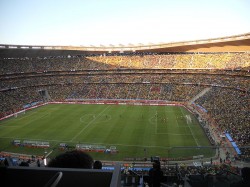 Cornwall ON – Cheating is quite common place in soccer. Players and coaches alike operate on the very edges of what is lawful and quite often cross the line and become cheats. One of the great challenges for today’s officials is to know when a player is faking. As I watched Brazil yesterday, and saw Robinho rolling around in pain, I was struck by the commentator who assured us all; “that he would be OK.”
Cornwall ON – Cheating is quite common place in soccer. Players and coaches alike operate on the very edges of what is lawful and quite often cross the line and become cheats. One of the great challenges for today’s officials is to know when a player is faking. As I watched Brazil yesterday, and saw Robinho rolling around in pain, I was struck by the commentator who assured us all; “that he would be OK.”
After a very short stay in the English Premier League, everyone knows that Robinho is a faker. Such a pity that this prodigious talent should find the need to cheat when he is capable of playing the beautiful game like few others. His pin-point pass to set up the second goal was a piece of soccer magic.
In today’s match between South Africa and Uruguay the goalkeeper was red-carded for tripping a forward in the penalty area. Even with the benefit of the slow motion video replay it was difficult to see if he actually touched the forward who went tumbling. Players are taught to fall if they feel any contact and to fain injury making it extremely difficult for the referee. I think the referee was taken in by the Uruguayan’s performance, severely jeopardizing the potential for the host country to make it into the last 16.
This acting is all very familiar to students of the game but, when I was watching Argentina, I saw something new. Something that belongs more on NFL football fields than the pitches of the World Cup. I noticed that Argentinean players were running interference in front of their star player Messi. Tevez, a tough uncompromising competitor, was matching his run to that of Messi and physically clearing a path for him.
The one goal that defeated South Africa that day was scored by a defender heading from an area that had been “cleared” by players holding defenders back from reaching the ball. I shall be watching vigilantly for further evidence of this in future Argentina games.
I am reminded of another World Cup, the rugby World Cup held some years ago in Australia, when the Australian rugby players introduced obstructive runs to allow a second wave of backs to attack with greater penetration. Australia went on to win that World Cup and rugby had to revisit how “obstruction” was interpreted. Will this new tactic take Argentina to the final this year, or will the drama skills of the Brazilians be the more significant cheating that brings success?
As is often the case, rugby has got things right a little ahead of soccer and they have the “Video Referee”. The referee on the field can choose to consult the video referee and get the benefit of all those slow motion replays. We have it in hockey and no-one complains, it is amazing that an event such as the World Cup, with all its attendant hype, can be at the mercy of those who would cheat. It is time for CHANGE!
David Rawnsley is President of the Char Lan Minor Soccer Association as well as Executive Director of FOSS, Friends of SD&SG Soccer and a district Referee, as well as co-founder of Char-Lan Women’s Soccer.
Soccer is his Passion, and we’re hoping to get several reports from him during the 2010 Fifa World Cup!
please visit our sponsors:


David. Keep doing your write-ups.Thanks
Thoughtful and interesting article, David. I look forward to more.
If the referees try any of this nonsense in the England games, I hope the location of the referees’ hotel becomes public. 🙂 They’ll never try any of those stunts again!
Cheers!
Three cheers for Albion and St.George.
Is this a sign of the times along with plagerism and taking the easy way out? Most sport seems to be changing / altering rules as of late, why should soccer be different?
And when will Canada get a team?
Old sports adage: If you’re not cheating, you’re not trying. This is nothing new. We live in a win at all costs world, and that doesn’t just relate to sports.